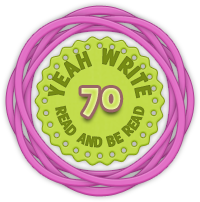H starts preschool again in two weeks. Part of me is sad
that the summer has flown past. I still feel like we’re unpacking and settling
into our new life in Illinois. How could it be that it’s already time to go
back to school and settle into that routine?
But there is a part of me that I think of as Naughty Mom.
Naughty Mom is jumping up and down excited that H will be in school three days
a week. I will have so much more time to finish unpacking and sorting. To run
errands more quickly and efficiently. To get my haircut without growing eyes in
the back of my head to keep an eye on her.
This makes me feel guilty. I adore staying home with H. It’s
something I always wanted to do. My mom was home with us, and as a kid I loved
knowing that she’d be there. I loved coming home to her after school. I want to
do that for my kids. When she learns something new or tells me some hilarious story
she’s invented, I’m thrilled that she’s doing that with me and not with a
stranger. I’m more than glad to be her best friend right now.
More than that, I’m really lucky I can stay home. Not every
mom even has that choice. I know lots of people who would probably love to be
home full time but can’t afford it. We’re in a great place where I can have the
option to stay home.
Despite all that, I discovered a long time ago that I am not
cut out to be the mom with unflagging energy who is ready for a romp every
moment and has fun activities and crafts planned, accompanied by nutritional
snacks and developmentally suitable outings. When I write it that way, I don’t
actually know any mom who is like that. If you do, check her sanity, then
nominate her for sainthood. I find that I need a few hours of alone time here
and there to save my patience and my sanity.
In practice a lot of staying at home has turned out to be
fitting in necessary errands, like the grocery store, into a very small child’s
schedule. Another example is trying to read books to her while I fold laundry. You
generally try to run a house and be a full time play mate at the same time. Like
so many moms before me, I now lament the days when she didn’t care where we
went, what she wore, or even really what she ate. At three she is her own tiny
woman who has definite opinions on everything; opinions that I readily respect,
but can’t always allow to reign. Now it’s all about trying to coax her to the
potty with enough wiggle time to leave the house promptly, but not so much that
she’ll have to pee in the middle of the commissary. And may God have mercy on
my soul if I forget to bring snacks and a drink with us everywhere we go.
Naughty Mom is the one who contemplates selling her to the
gypsies. She’s the one who just wants to sit quietly in Barnes and Noble and
soak up the rows of books. She stares at the stacks longingly every Monday as
we march to Story Time. Naughty Mom also has a bad spending habit when it comes
to books, so it’s best to keep an extra close eye on her in places like Barnes
and Noble.
Every mom has a Naughty Mom. Every mom has a day when she
counts the minutes until bed time so she can pour herself a relaxing cup of
tea/glass of wine. Every mom is mildly excited to regain some freedom when
school time comes. So why do I feel guilty about it?
When did we come to expect ourselves to not only stay home
but to love and adore every moment of it? Who told us it had to be that way? It
wasn’t my mom, who went back to school to finish her degree as soon as I
started first grade. And I’m thrilled that she did. I was proud of her then,
and I’m even more proud now as a mom myself. She knew she needed a grown up
life, not just a kid life. It wasn’t my friends telling me that, some of whom
stay home and some who are back at work. They’re the ones pouring the wine,
after all. It wasn’t my husband, who never expected me to stay home, but was
glad I wanted to.
As Radiohead would say, “You do it yourself you do. And that’s
why it really hurts.” I told me that I was expected to love every minute of
parenting my daughter. I am the one who wonders if I’m really doing a good job
if we just spend the day watching a movie and doing laundry. I’m the one who
envies the moms I know with a more educational background, who can, in my eyes,
properly guide their little ones.
So, Jamie, let’s check and see how H is doing with your
sub-par parenting. Sweet and polite? Check. Knows her ABCs and 123s? Check. Can
write her name? Check. Can nearly go potty on her own? Check. Is happy and
healthy? Check.
Now I laugh at myself a bit. Yeah, clearly I am screwing her
up. Maybe instead of feeling bad about Naughty Mom’s excitement at free time
this fall, I should just go with it. Because you know what? H is not being sent
to sit in a room and stare at a wall. She’s going somewhere fun to hang out
with kids and color and sing and she comes home happy. And if she can come home
to an equally happy, recharged, fully-engaged Mommy, then we both win.



